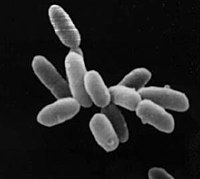
Photo from wikipedia
Although the extremely thermophilic archaea (Topt ≥ 70°C) may be the most primitive extant forms of life, they have been studied to a limited extent relative to mesophilic microorganisms. Many of these… Click to show full abstract
Although the extremely thermophilic archaea (Topt ≥ 70°C) may be the most primitive extant forms of life, they have been studied to a limited extent relative to mesophilic microorganisms. Many of these organisms have unique biochemical and physiological characteristics with important biotechnological implications. These include methanogens that generate methane, fermentative anaerobes that produce hydrogen gas with high efficiency, and acidophiles that can mobilize base, precious and strategic metals from mineral ores. Extremely thermophilic archaea have also been a valuable source of thermoactive, thermostable biocatalysts, but their use as cellular systems has been limited because of the general lack of facile genetics tools. This situation has changed recently, however, thereby providing an important avenue for understanding their metabolic and physiological details and also opening up opportunities for metabolic engineering efforts. Along these lines, extremely thermophilic archaea have recently been engineered to produce a variety of alcohols and industrial chemicals, in some cases incorporating CO2 into the final product. There are barriers and challenges to these organisms reaching their full potential as industrial microorganisms but, if these can be overcome, a new dimension for biotechnology will be forthcoming that strategically exploits biology at high temperatures.
Journal Title: FEMS microbiology reviews
Year Published: 2018
Link to full text (if available)
Share on Social Media: Sign Up to like & get
recommendations!